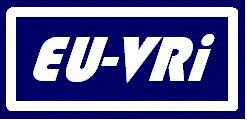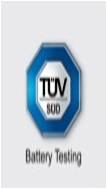|
|

|
| |
European Virtual Institute for Integrated Risk Management (EU-VRi)
| |
| |
 |
The European Virtual Institute for Integrated Risk Management (EU-VRi) is the European organization which provides professional services, consulting, information and education needed in the broad area of modern integrated risk management and, in particular, management of emerging risks. EU-VRi has been legally established in Nov. 2006 by 5 founding members (BZF, INERIS, Steinbeis, Technologica, and University of Stuttgart). EU-VRi is organized as a European Economic Interest Grouping (EEIG) and its purpose is to facilitate or develop the economic activities of its members by a pooling of resources, activities or skills. The activities of the EEIG are related to the economic activities of its members and the main goal of the EEIG is to add value to the businesses of the EU-VRi members. In addition, EU-VRi facilitates the mobility of researchers between research and industry, and it acts as a vehicle to create efficient consortia to address the R&D needs and other needs of industry. In 2009 about 40 companies from the EU and other countries are associated members. They come from industry, R&D organizations and academia, governmental and non-governmental/international organizations and SMEs (small and medium enterprises). From 2009, EU-VRi has increased its participation in projects dealing with emerging technologies, such as nanomaterials and new energies, and the associated risk management.
|

| |
| | | |
| | | |
| |
|
SAFT is a world specialist in the design and manufacture of high-tech batteries for industry. SAFT batteries are used in high performance applications, such as industrial infrastructure and processes, transportation, space and defense. SAFT is the world’s leading manufacturer of nickel-cadmium batteries for industrial applications and of primary lithium batteries for a wide range ofend markets. The group is also the European leader for specialised advancedtechnologies for the defence and space industries. With approximately 4,000employees worldwide, SAFT is present in 18 countries with a 2009 turnover of559 million Euros. Its 15 manufacturing sites and extensive sales network enable the group to serve its customers worldwide.
In the field of new technologies, SAFT has developed Nickel – Metal Hydride and Lithium-ion battery systems which are anticipated to become the dominant technology for most of the applications. Beside hybrid and electric vehicles applications, renewable energies are for SAFT a strategic item for potential business development.
SAFT has more than 15 years experience in the design of lithium-ion systems applied to automotive (hybrid and electric vehicles). It has demonstrated experience in program coordination through several European programs (Li-ion Heart,Pomerol...), multi-national (Eurogia Programs Sol-ion and ILIS, USABC) and national programs (Predit, Ademe, ANR…). SAFT has been involved in many European projects related to Distributed Generation (EU-DEEP, GROW-DERS) and photovoltaic (SoS-PVI). Since 2008, SAFT is operating in France the first world industrial manufacturing plant for Li-ion cells and has opened a new plant in the US for the manufacturing of lithium-ion cells in 2011.
SAFT is bringing to the program its expertise of system design in the field of lithium-ion batteries. The strategy of SAFT is to be a leading partner in the elaboration of future safety standards that will enable a large dissemination of lithium-ion batteries for stationary applications.
|

|

| |
| | | |
| |
EDP Distribuição - Energia, S.A. (EDPD)
| |
| |

|
EDP Distribuição (EDPD) is part of EDP Group and Portugal’s incumbent DSO (accounting for 97% of the market with more than 6 million customers). EDPD coordinates Project InovGrid which entails a large-scale smart grid demonstration project already under way in Évora (Portugal), impacting more than 50.000 consumers. InovGrid project targets different aspects such as: detect and solve grid defaults and to minimize losses; improvements in grid operation and future planning, based on more detailed information about operating conditions; enable and promote a more active role for customers/producers; develop a support platform for new commercial services, based on greater proximity to the customer; involvement of all the relevant stakeholders, including, but not limited to, local, national and European authorities, regulators, industrial companies, research institutes and universities, consumers, producers, and the local population in general, with the objective of global dissemination of the results that will contribute to the shift of paradigm towards Smart Grids.
|

| |
| | | |
| |
Institut National de l'Environnement Industriel et des Risques (INERIS)
| |
| |
|
Created in 1990, INERIS is a public research body of an industrial and commercial character, under the supervision of the French Ministry of Environment and Sustainable Development. In 2010, the staff numbered 584 people including more than 300 engineers, research scientists and managers, and 55 PhD students. INERIS’s mission is to assess and prevent accidental and chronic risks to people and the environment originating from industrial activities, chemical substances and underground works. INERIS engages in two main sorts of research and studies:
- Characterisation and understanding of the phenomena that underlie the risks affecting the safety or property, people, health and the environment as a result of economic activities,
- Improvement of the identification and evaluation of such risks in order to enable decision-makers in the public and private sectors to adopt the most appropriate measures to improve environmental safety.
Using the findings of this research works, INERIS offers advice and high-level technical expertise to public administrations, industry and regional authorities and develops an active policy for disseminating information to a wide public. Technical consultation is also provided to support Public Authorities in their regulatory and standardization activity.
INERIS’s work is based on an original methodology that combines an experimental approach, modelling and experience feedback. INERIS is equipped with physico-chemical analysis laboratories and testing and computing facilities that rank among the best in France.
INERIS is involved in a number of international and European research programs in partnership with industry and other scientific research bodies both in France and abroad. Within Europe, INERIS has strengthened its involvement in the European Commission’s framework programs for research and technological development.
INERIS is leader of the French platform STEEVE (Electrochemical Energy Storage for Electric Vehicles) where INERIS contributes to the evaluation, risk reduction & product certification of batteries. Within Europe, INERIS is involved in HELIOS (High Energy Lithium-Ion Storage Solutions) project, where INERIS performs thermal abuse tests and reaction studies. Further INERIS participate at the European network ALISTORE.
|

|

| |
| | | |
| |
TÜV SÜD Battery Testing GmbH (TUV)
| |
| |

|
The TÜV SÜD AG is an internationally well known institution for testing and certificating products of many different industries. In 2009 it founded the TÜV SÜD Battery Testing GmbH, a joint venture with the LION Smart GmbH.
Since the foundation it grew to currently 10 employees. In 2010 first tests on lithium ion batteries were conducted. At the moment a state of the art laboratory is being built and will be completed in the next months. In this laboratory lifetime, characterization, environmental and safety tests are going to be carried out.
The testing is focused on high capacity batteries, mainly used in electric mobility applications. Cells as well as modules and packs are tested in the facilities. Additionally partner laboratories for battery testing exist in Canada and Singapore. With the TÜV SÜD AG and its experts in many different fields of testing in the background also specialized testing tasks can be conducted with a short preparation time and a high range of data can be recorded, therein included is e.g. a gas analysis of the vented gas.
|

| |
| | | |
| | | |
| |
|
The Power Systems Unit (USE) is INESC Porto main actor in the areas of electrical energy. The Unit employs close to 70 collaborators, including 16 PhD holders. It is internationally recognised for its expertise in problems relating to the integration of wind power and renewable energy in general in power systems. USE is also recognised in the areas of distributed generation and smart-grids, the areas traditionally associated with planning and operating power systems.
The high level of expertise developed has allowed specialists at USE to take on key roles in important EU projects as part of the successive framework programmes that led to notable scientific and technical advances with considerable impact on industry. This has led to contracts for development and consultancy with companies manufacturing equipment, generation, transmission and distribution companies, regulators, government agencies and investors in Europe, South America, the United States of America and Africa.
INESC Porto develops expertise in several research areas, namely:
• Integration of Renewable Energy Sources in Transmission Systems – development of studies for the Portuguese and Spanish TSOs to evaluate reserve requirements of each system through reliability analysis, with large scale integration of renewable sources; participation in EU project ANEMOS.PLUS on the optimal management of electricity grids linked to large-scale wind power generation; and development of steady-state and dynamic behavior analysis for the integration of wind parks for wind park developers.
• Microgeneration and Microgrids – participation in the EU-financed MICROGRIDS and MORE MICROGRIDS projects aiming to study technical/economic feasibility of large-scale integration of microgenerators along with controllable loads and storage devices in LV grids.
• Electric Vehicle Integration in the Distribution Grid – Scientific coordination of the EU-financed MERGE project aiming at evaluating the impacts of EV on the EU electric power systems regarding planning, operation and market functioning and the national REIVE project in collaboration with the Industry, where the impacts of EV in LV networks will be evaluated in a test bed, under a laboratorial environment where the major elements of a LV network are present.
• Development of a technical architecture for the implementation of a fully active distribution network – INOVGRID project, which involves the installation of 6 million of smart-meters and was launched by the Portuguese DSO, addresses the need to introduce more intelligence to manage and control distribution networks in order to progress towards the smartgrid paradigm, giving support to all new smart metering and commercial processes.
|
 
|

| |
| | | |
|
|
|
|
|
|